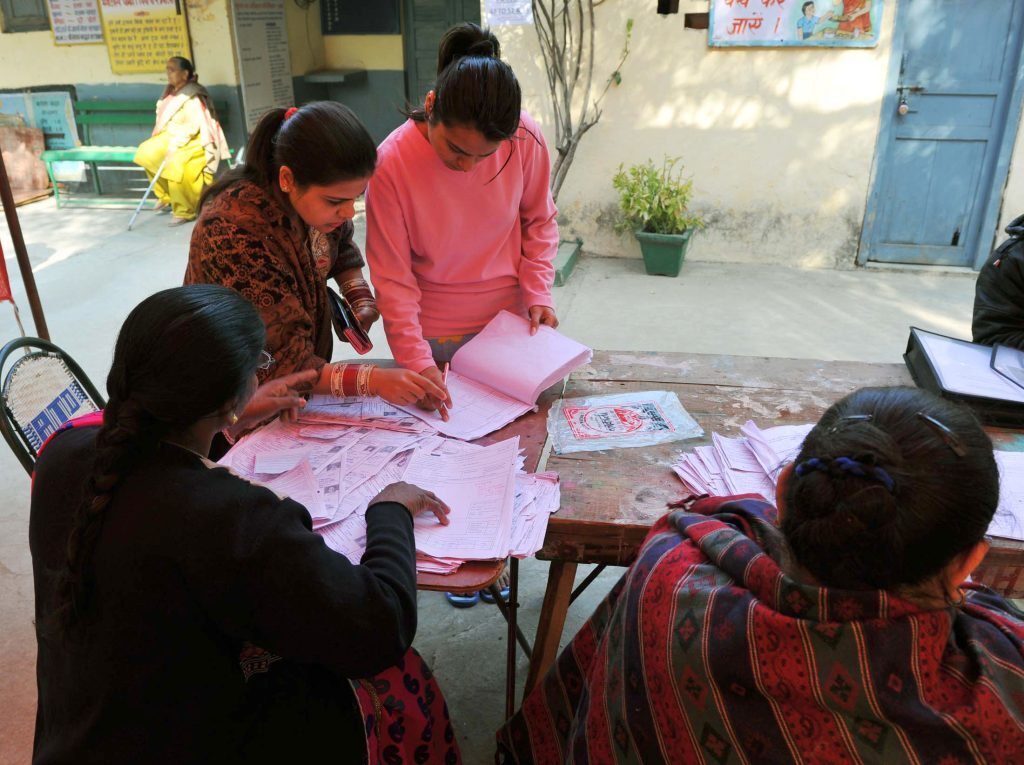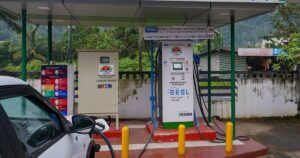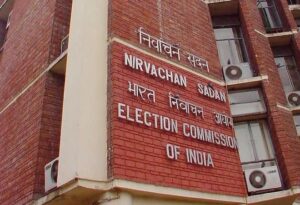Electoral Roll Revision Is Sparking Widespread Social Anxieties

The Election Commission of India’s Special Intensive Revision exercise to clean electoral rolls is related to the agenda to ‘detect, delete, deport’ suspected ‘illegal Bangladeshi infiltrators’ from the electoral rolls (Photo: Election Commission/GODL-India via Wikimedia Commons)
- The Special Intensive Revision of the voters list across 12 Indian states could potentially lead to sharpening of the communal divide in the country
West Bengal recently recorded 28 deaths, allegedly due to anxiety related to the Special Intensive Revision (SIR) of the electoral roll that is being carried out by the Election Commission of India across 12 Indian states, including West Bengal.
Unlike the 11 other states, West Bengal shares a border and millennia of history with neighbouring Bangladesh, with political mudslinging about undocumented Bangladeshis and Rohingyas living in India as citizens reaching a crescendo before the SIR announcement.
The SIR exercise demands proof of citizenship (in the shape of passports, government issued ID cards, pension and land documents, educational certificates etc) from people who want to be included in the new voters’ list, an exercise that was nearly automatic earlier, once an Indian turned 18.
The demand of citizenship and legacy proof, purportedly to ensure “no eligible citizen is left out” of the election process, and also that “no ineligible person is included in the Electoral Roll”, coupled with the fear of being turned into an “ineligible” person, a de facto non-citizen, has led to anxieties.
While the Election Commission claims that it needs to ascertain citizenship to revise electoral rolls, there is considerable fear that this is the first step towards creating a de facto National Register of Citizens (NRC), after the 2003 amendments to the Citizenship Act limited Indian citizenship by birth to the years between 1950 and 1987 and the 2019 amendments introduced religion into citizenship considerations for the first time.
The only NRC to be prepared till date, in Assam (another state bordering Bangladesh) in 2019, kept 1.9 million people out of the register, with 63 such people interned at the Matia detention camp while 27 died in detention. Many more died during the NRC process, through stress-related heart attacks and suicides, a stark premonition to the SIR.
Nevertheless, the ruling Bharatiya Janata Party, the architect of both the 2003 and 2019 amendments, is supporting the SIR exercise. SIR is related to the agenda to ‘detect, delete, deport’ suspected ‘illegal Bangladeshis’ which originated in Assam during the Assam Agitation of 1979-85 and was later adopted by the BJP in the late 1990s. Undocumented immigrants from Bangladesh are blamed for changing the demographic pattern of the country, spike in crime, acts of terror and taking away jobs that rightfully belong to Indians. The rhetorical power of this framing has successfully entered popular consciousness after years of high-pitched campaigns.
Demonising immigrants
Films made in West Bengal routinely paint potentially undocumented Bangladeshis as agents of fundamentalist forces. Increasingly, news channels air unsupported accusations of similar nature. Popular sentiment starts to imagine that the SIR exercise will lead to the detection and deportation of undocumented Muslim immigrants from Bangladesh residing in West Bengal.
Lessons from the NRC exercise in Assam and the recently completed SIR in Bihar portend otherwise.
Although it was widely expected to identify immigrant Bengali-speaking Muslims, 500,000 people outside the Assam NRC are Bengali Hindus, 200,000 Assamese Hindus, another 700,000 Muslims, and 150,000 are Gorkhas. The SIR deaths in Bengal, recorded at 11 by November 7, similarly cut across communities, including a young Hindu woman who set herself on fire for fear of not being included in the electoral roll and a 32-year-old Muslim man who died of suicide after discussing discrepancies in the spelling of his father’s name in a voter card. More recently, a sex worker in Howrah district hanged herself upon learning that her name does not feature in the 2002 electoral list.
While absolute numbers for women kept outside the NRC have not yet been released, field surveys across four districts in Assam reveal that poor women have borne a disproportionate brunt of the exercise. The reason: near impossibility of providing legacy documents in a region where homes are regularly inundated in floods and women are married off early and lose connection with natal families, do not own land or homes or are simply unable to do the rounds of government offices to substantiate their legacy claims.
The pattern was the same during the SIR exercise in Bihar, where the female to male ratio in earlier electoral rolls dropped from 907 per 1,000 to 892 per 1,000, because of the difficulty women faced in submitting educational certificates, birth proof or land records in a region marked by endemic poverty, low literacy and the near absence of women as landowners. Women are also the largest migrants in India, moving away from home due to marriage.
Exclusionary measure
In West Bengal, this exclusion is likely to be greater. West Bengal leads the country in child marriage rate, resulting in early marriage migration and lack of education. Both stop women from holding papers that would enlist them in the SIR. Sex workers and trans people are likely to find it even more difficult.
During the Assam NRC, in Silchar alone 200 sex workers were kept out of the process. Across Assam, 2,000 trans women did not make it to the register. Often separated from or disowned by natal families, sex workers and most trans persons exist in the liminal spaces of society, the most dispossessed. For trans persons, birth certificates and educational accreditations often do not match their gender, physical appearance and names. Between the 2019 NRC and 2025 SIR, nothing has been done to enable the inclusion of sex workers, poor women and trans persons into these new lists.
They are rightfully afraid of losing voting rights, that entails inevitable loss of other rights and citizenship entitlements.
Sunali Khatun, a Bengali migrant rag picker in Delhi, was picked up on suspicion of being an undocumented Bangladeshi in June 2025 and pushed across the border. The Calcutta High Court ruled that Sunali’s deportation was unlawful, the Bangladesh authorities ruled her as an Indian who unlawfully entered the country. Eight months’ pregnant, Sunali continues to be interred in a Bangladeshi jail, despite fulfilling all citizenship and electoral roll requirements, including the presence of her parents in the 2002 voter list.
The ideological imperative to ‘detect, delete, deport’, has reached far beyond the confines of Assam. Since 2019, it has already disenfranchised millions of poor and marginal women and promises to ‘delete’ many more.
There have been past reports of the alleged presence of undocumented Bangladeshi immigrants in several Indian states. However, the recent past and longer history of attempts to evict such suspected Bangladeshis has shown a tendency to disproportionately impact Indian Bengalis, and particularly some sections among them, such as women, the poor, and Muslims.
The EC’s hasty SIR exercise, conducted in a climate of suspicion and fear, is already creating a deleterious impact on social harmony – whipping up communal frenzy, suspicion and death of overworked officials, and apprehensions of statelessness — all in a state scheduled to hold legislative assembly elections next year.
(Published under Creative Commons from 360info.org)





